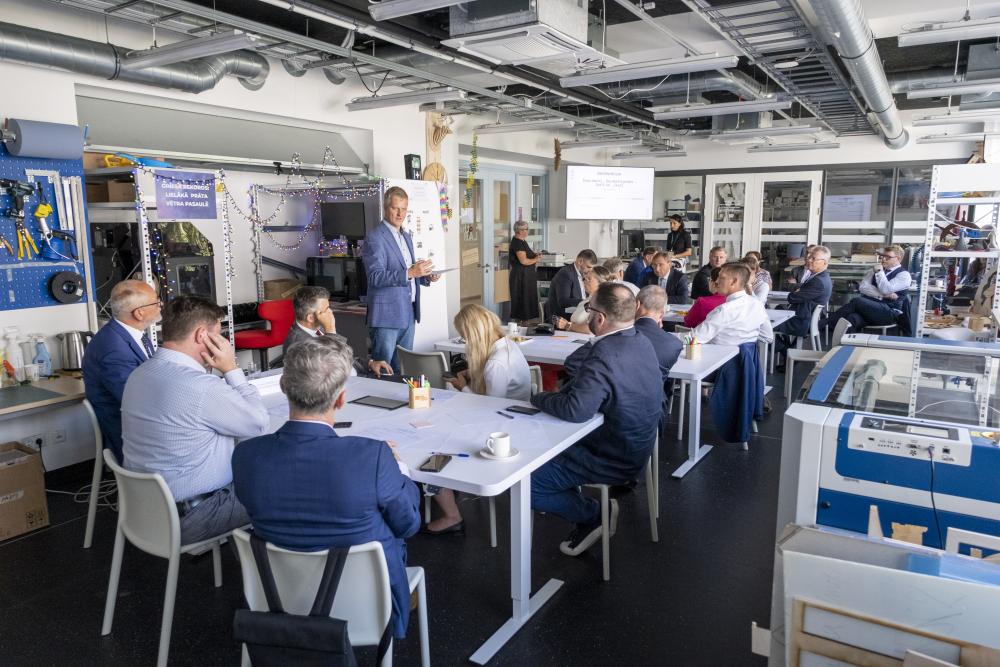Universities play a decisive role in the development of the knowledge economy - they concentrate the intellectual capacity and skills to create new knowledge, which, transferred to society and industry, will change and develop it. In a workshop at Riga Technical University (RTU), heads of Latvian universities of science, art and culture are meeting with the leadership of the Ministry of Education and Science, Economy, Finance and Health to learn about the "business portfolio" of universities for the development of the national economy and jointly generate ideas for significantly closer cooperation between universities and industry . Rector of the Latvia University of Life Sciences and Technologies (LBTU) Irina Arkhipova and LBTU vice-rector of sciences Gatis Vītols took part in the event.
Latvia's economic growth potential without reforms is around 2.5% per year, according to an assessment made by the Bank of Latvia. Growth can be promoted by making fuller use of labor reserves, investing in capital growth and acquiring new knowledge, which allows for more efficient use of labor and capital, says Finance Minister Arvils Ašeradens. He emphasizes that universities perform five fundamentally important functions - accumulate knowledge, create knowledge so that society can better develop and prosper, transfer knowledge to the new generation, which enters the economic and social space with new knowledge and changes society, transfers knowledge to society and the economy. "As a society, we lack fundamental knowledge on how to move forward. Knowledge is the only way for society to agree on one development concept and to implement it, and universities are the only ones capable of creating new knowledge,» emphasizes A. Ašeradens.
The Minister of Education and Science, Anda Čakša, also emphasizes the role of universities in the national economy, stating that the change in the funding and management models of higher education is aimed at the formation of universities as centers that also provide the state administration and policy makers with ideas and help to define future challenges, clearly indicate to problems that may not even be visible yet, so that it is possible to proactively find solutions to them.
She is joined by Jānis Salmiņš, Deputy State Secretary of the Ministry of Economy for Human Capital Management and Macroeconomic Development, confirming that the role of universities as knowledge leaders must increase. The results of the exams in the exact subjects clearly signal the risks for the future economy, the possibility of increasing the country's competitiveness, he emphasizes. On the other hand, Minister of Health Hosam Abu Meri, along with the need to promote economic growth, calls on us not to forget the role of science in the development of a socially and physically healthy society. "Without able-bodied people, nothing will develop. In order for research to develop, for innovations to arise, for start-ups to implement them, physically active and healthy people who are capable of both creating ideas and using them are needed," the minister says.
"Availability of talent, creation of global new knowledge, transfer of intellectual property - these factors determine the attractiveness of the investment environment," RTU rector Tālis Juhna also emphasizes, citing the Dutch company "Fokker Next Gen N.V." as an example. RTU's scientific excellence in the field of hydrogen is the basis for cooperation between RTU and the Dutch company "Fokker Next Gen" to create, together with other partners, a hydrogen research and innovation center of excellence in Latvia, which will provide a platform for cooperation in research, technology development and testing.
Both science universities - RTU, University of Latvia (LU), Riga Stradiņš University and LBTU - as well as the Latvian Academy of Culture and the Latvian Academy of Arts are interested in more intensive cooperation with industry, with the rectors presenting their "business portfolios" to the ministries. which shows both contract research, globally significant research, a significant contribution to the development of human capital and a significant role in the development of the innovation ecosystem, involving industry, existing and emerging startups, students and researchers. However, the statistics are still stark - investments in research and development (R&D) in Latvia are still among the lowest in the European Union, and if university investments in R&D approach the international level, private capital investments are critically low. The workforce is more concentrated in low-productivity production, high value-added industries are relatively underdeveloped, high-tech production lacks human resources and knowledge.
How to change the situation by increasing the role of universities in the national economy of Latvia, increasing the interest of companies and the need to cooperate with higher education and scientific organizations in the creation of innovations, thus achieving the transformation of the national economy in the direction of the knowledge economy? In order to search for solutions, the representatives of universities and ministries jointly generate ideas in the workshop:
- for the development of joint talents of Latvian industry and universities;
- for the creation of an inclusive cooperation model between universities and industry;
- legislative changes that could potentially facilitate technology transfer;
- for the development of the skills of start-ups and the development of the «venture fund» of start-ups.
The partners also agree to continue to meet regularly in order to promote the transfer of knowledge in society and industry and to develop the Knowledge Mile, which, according to Dauņš Auer, professor of the LU and chairman of the board of the "LaSER" think tank, is a unique opportunity in the Nordic countries, but so far not fully used. In order to use the potential of the Knowledge Mile, it is planned to create a platform that will ensure a regular dialogue between universities and the state administration.
Photo: LBTU
